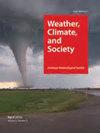Climate change impacts on subsistence paddy farming in Indian East Coast: A Geospatial and Community Perception Assessment
IF 1.9
4区 地球科学
Q3 ENVIRONMENTAL STUDIES
引用次数: 0
Abstract
Impact of climate change on subsistence agriculture is a major concern in the developing world. The vulnerability of the coastal regions to climate change has been highlighted in particular. The present study assessed the impact of climate change on subsistence rice farming in Eastern Indian coast using an integrated approach of statistical trend analysis by Mann Kendall’s Test and Sen’s Slope Estimation of climate data, remote sense-based land cover analyses using Normalized Difference Vegetation Index (NDVI), Normalized Difference Water Index (NDWI) and Land Surface Temperature (LST) complemented by questionnaire-based perception survey among the farming community. There has been noticeable change in both ambient temperature and LST in the region. Delayed arrival of monsoon critically impacts the cropping calendar. The crop harvest season has shifted further into a time of the year that is prone to weather extremes. Analyses of NDVI and NDWI also indicate shift in cropping calendar. Over years, there was increasing degree of negative correlation between LST and NDVI in November which indicates increasing water stress for crops in that time juncture. This may further cause crop sterility and yield loss. The study also reveals large scale conversion of paddy growing agricultural land into prawn aquaculture ponds. Farmers attributed such landuse change to cultivation stress caused by delayed monsoon and consequent crop loss from weather extremes and changes in crop agronomic conditions. Farmers also report increased pest attack and attribute that to increasing temperature regime.气候变化对印度东海岸自给水稻种植的影响:地理空间和社区感知评估
气候变化对自给农业的影响是发展中国家关注的一个主要问题。沿海地区对气候变化的脆弱性尤其受到强调。本研究采用Mann Kendall检验和Sen斜率估算的综合统计趋势分析方法,利用归一化植被指数(NDVI)、归一化差异水指数(NDWI)和地表温度(LST)进行基于遥感的土地覆盖分析,并结合基于问卷的农业社区感知调查,评估了气候变化对印度东部沿海稻作的影响。该地区的环境温度和地表温度都有明显的变化。季风的延迟到来严重影响了种植日历。农作物收获季节已经进一步转移到一年中容易出现极端天气的时间。NDVI和NDWI的分析也表明了种植历的变化。从历年来看,11月LST与NDVI的负相关程度呈增加趋势,表明作物在该时段的水分胁迫增加。这可能进一步造成作物不育和产量损失。该研究还揭示了水稻种植农田大规模转化为对虾养殖池塘。农民将这种土地利用变化归因于季风延迟造成的种植压力,以及极端天气和作物农艺条件变化造成的作物损失。农民还报告虫害增加,并将其归因于气温升高。
本文章由计算机程序翻译,如有差异,请以英文原文为准。
求助全文
约1分钟内获得全文
求助全文
来源期刊

Weather Climate and Society
METEOROLOGY & ATMOSPHERIC SCIENCES-
CiteScore
3.40
自引率
13.60%
发文量
95
审稿时长
>12 weeks
期刊介绍:
Weather, Climate, and Society (WCAS) publishes research that encompasses economics, policy analysis, political science, history, and institutional, social, and behavioral scholarship relating to weather and climate, including climate change. Contributions must include original social science research, evidence-based analysis, and relevance to the interactions of weather and climate with society.
 求助内容:
求助内容: 应助结果提醒方式:
应助结果提醒方式:


